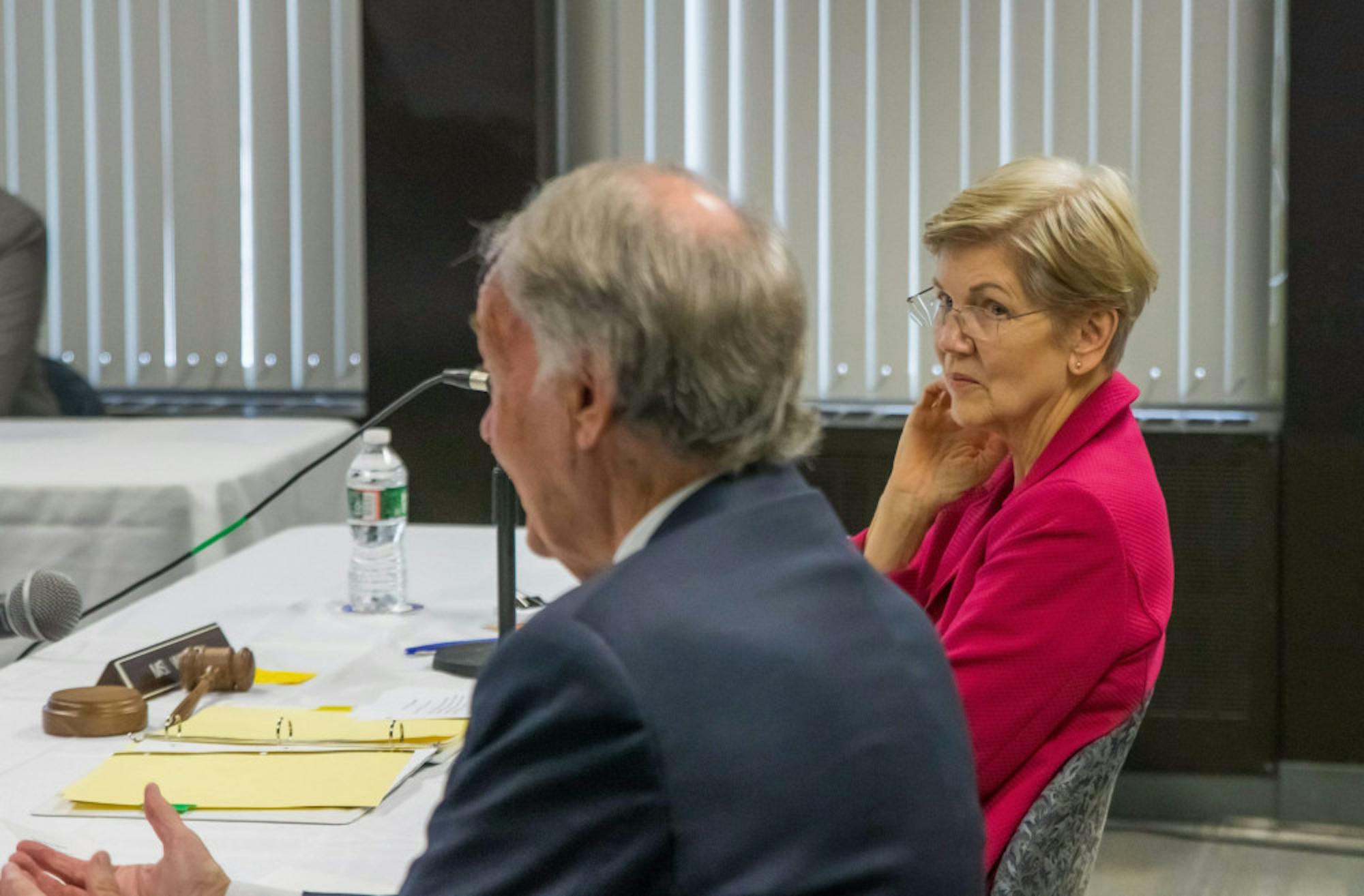Senator Elizabeth Warren chaired a senate subcommittee hearing in Boston on Friday, focusing on management failures within the Massachusetts Bay Transit Authority. Senator Ed Markey joined Warren for the Senate Committee on Banking, Housing and Urban Affairs’ Subcommittee on Economic Policy hearing.
Over the past two years, the T has experienced delays, derailments, collisions, fires and even a death earlier this year when a man was trapped in the door of a red line train. Warren addressed these problems in her opening statement.
“The people of Massachusetts need a safe system, but they also need a transit system that works — a system that is reliable, accessible, frequent, dependable, clean and that gets you where you need to go without crazy delays,” Warren said.
Markey, who grew up in Malden, noted that greater Boston’s identity is “inseparable” from the T, calling the public transit system “the lifeblood of the region.”
“As any rider of the T can tell you, the MBTA has a long way to go,” Markey said in his opening statement. “Let this hearing today be an honest and unsparing account of the T’s neglect, as well as a first step towards making the T a vibrant, prosperous transit system.”
The subcommittee first called Nuria Fernandez, administrator of the Federal Transit Administration, to testify. The FTA conducted a safety management inspection of the MBTA’s rail system between April and June of this year, finding that the MBTA is understaffed and that the Mass. Department of Public Utilities failed in its duty to actively oversee the MBTA’s management.
“[The] MBTA was not adequately staffed, across the agency, to meet the demands of both an aggressive capital expansion program and the basic day-to-day safe operation of the system,” Fernandez said. “I feel that the system is safe and that people should continue to ride it. Yet, tough decisions will have to be made now to create a better, safer future.”
Following Fernandez’s testimony, Boston Mayor Michelle Wu, Executive Director of TransitMatters Jarred Johnson, Chair of the DPU Matthew Nelson and MBTA General Manager Steve Poftak delivered statements and fielded questions from Warren and Markey.
Warren scrutinized Nelson and Poftak’s records, telling the former, “It is your job to make sure that the MBTA is doing its job, and you are failing,” and criticized the latter for not making safety risk decisions based on safety data.
“[T]here are a lot of reasons why safety risks on the T have grown over time,” Warren said. “But the only way out of this is with accountability. … If we don't have that, then we are not going to have a T that gets better.”
Citing shutdowns and slow service, Markey asked Poftak to give a specific date when repairs to the orange line will be complete. Poftak declined to answer, saying, “If I put a date in place, it doesn't prioritize safety, it puts pressure on field staff to make a decision that is not based on what is the safest condition in the field.”
Warren then asked Wu to elaborate on the effects of T delays and failures on riders. “The most obvious and devastating impact is the injury and loss of life,” Wu said. “This has been … driven by a lack of clear safety culture and decades of deferred maintenance.”
Wu added that T shutdowns have an indirect effect on the city’s economy and quality of life.
“When ridership goes down, that means more traffic for everyone,” Wu said. “That means the entire region is paralyzed, and so any question of safety hurts our residents and it hurts our economy.”
Johnson, whose organization TransitMatters advocates for improved public transit in greater Boston, noted that T shutdowns have a disproportionate effect on poorer communities.
“Residents in under-resourced communities are more likely to be hourly workers or be in precarious employment,” Johnson said. “So the unreliability of the service cuts … literally took money out of the pockets of these folks and left some of them vulnerable to termination.”
“Failures to competently manage and invest in the T have left many families without safe and reliable transit,” Warren said. “If this incompetence continues, the T is going to see more shutdowns, more delays, more crowding, more derailments and potentially more accidents.”
Asked about solutions to mitigate congestion, Wu said that “fare equity on the commuter rail system could be done tomorrow and would likely boost ridership on the commuter rail to then ease the congestion and the load and burden on other forms of transit and on traffic as well.”
Markey noted that a silver lining of the orange line shutdown was the expanded usage of the city’s BlueBikes, after Boston offered free 30-day passes to riders in August.
“We were expecting, with 30-day free BlueBike passes, that maybe eight or nine thousand people might take us up on that,” Wu said. “It ended up that 60,000 people claimed those free passes. … Before the shutdown, the BlueBike system’s daily ridership record was just over 18,000 rides in one day, and during the shutdown it was 47,000 rides.”
Warren closed the hearing by calling for systemic change within the MBTA.
“The people of the Commonwealth deserve a reliable transit system that works for them and works for their families,” Warren said. “And to achieve that vision, we need new leadership from top to bottom.






